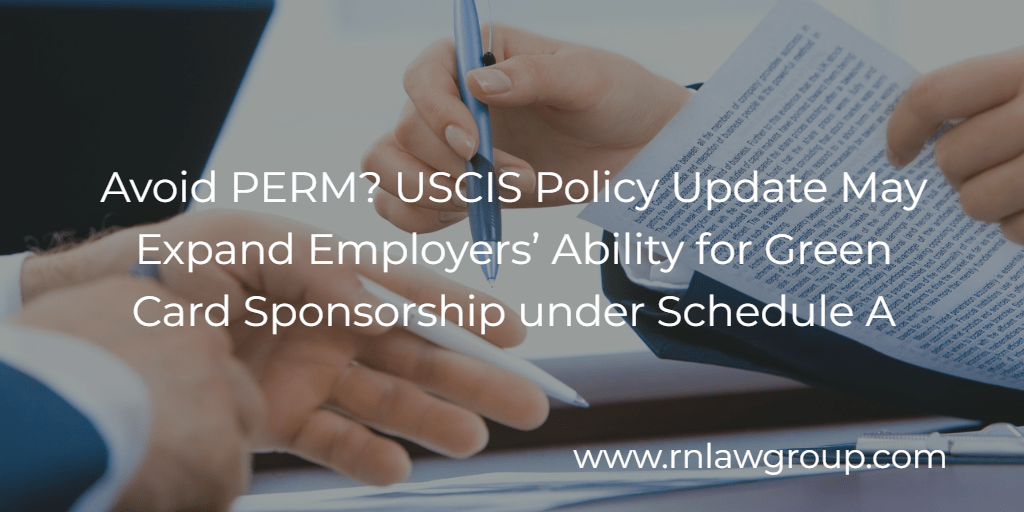
Avoid PERM? USCIS Policy Update May Expand Employers’ Ability for Green Card Sponsorship under Schedule A
U.S. Citizenship and Immigration Services (USCIS) has issued a policy update providing clarity regarding the term “science or art” for Schedule A, Group II occupations. This update, effective immediately, aligns the definition of “science or art” with that of the U.S. Department of Labor (DOL). The clarification expands the applicability of the Schedule A, Group II designation and could effectively increase an employer’s ability to sponsor foreign workers under this category.
What is “Schedule A”?
Employment-based 2nd and 3rd preference (EB-2 and EB-3) petitions often require employers to obtain PERM labor certification from the DOL before filing an I-140 Immigrant Petition with USCIS. However, for certain occupations categorized under Schedule A, DOL has determined that there is a shortage of qualified U.S. workers. This allows employers to bypass DOL review and submit an uncertified labor certification directly to USCIS. Therefore, an employer will not have to conduct the labor market test. Schedule A includes two groups of occupations: Group I includes registered nurses and physical therapists and Group II includes individuals with exceptional abilities in the sciences or arts (excluding performing arts).
Key Points and Impact:
USCIS has now adopted the DOL’s definition of “science or art” as any field of knowledge or skill in which colleges and universities commonly offer specialized courses leading to a degree. USCIS will adhere to this definition when adjudicating Schedule A petitions. This change could potentially expand the Schedule A, Group II designation to cover any employee working in a field for which colleges and universities commonly offer specialized courses leading to a degree, who also demonstrates exceptional ability in the sciences or arts, who has been practicing their science or art during the year prior to the application and who intends to practice the same science or art in the United States.
This recent change provides an additional avenue for employees with exceptional ability seeking permanent residency in the United States. By aligning the USCIS definition with that of the DOL, more foreign workers may qualify for Schedule A, Group II designation, which waives the labor market test for employment-based green card sponsorships in the EB-2 or EB-3 categories. The clarification streamlines the process, allowing foreign workers to avoid delays associated with PERM labor certification. While an employer must still obtain a Prevailing Wage Determination (PWD), foreign workers won’t face the lengthy wait of over 13 months to secure an approved PERM application from the DOL. Sponsorship through the Schedule A process is not only cost effective for employers, but very beneficial for foreign workers stuck in the green card backlog who need an approved I-140 quickly in order to extend beyond the H-1B 6 year limit.
At Reddy Neumann Brown PC, we are fully committed to providing our clients with all the options available for employment based green card sponsorship, particularly in light of the challenges stemming from extended PERM processing times. If you have any inquiries, please schedule a consultation with one of our immigration attorneys.
Krystal Alanis is a Partner at Reddy Neumann Brown PC with over 10 years of experience practicing U.S. business immigration law. Krystal manages the firm’s PERM Labor Certification Department, where she oversees all EB-2 and EB-3 employment-based green card matters. Krystal guides clients from a variety of industries through the maze of the PERM Labor certification process and has handled thousands of PERM applications throughout her career. Krystal guides employers through the I-140 and Adjustment of Status process, and assists clients with temporary work visas. Further, she oversees the firm’s I-9 compliance team where she advises employers regarding Form I-9 Employment Eligibility Verification requirements and conducts internal audits of a company’s I-9 records, processes, and procedures. Additionally, Krystal represents clients in Form I-9 U.S. Immigration and Customs Enforcement (ICE) inspections (Notice of Inspection). Krystal successfully settled a claim with ICE over Form I-9 substantive paperwork violations that led to an 88% reduction in civil fines for her client.

